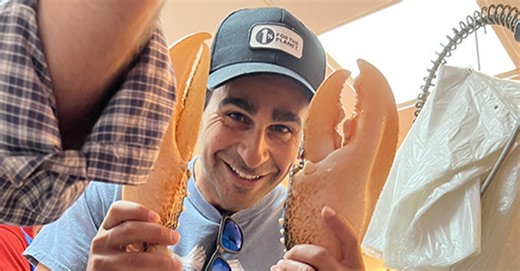E-Fish CEO on Food Education and “Gordon Ramsay’s Food Stars”
-
-
MIT Sloan
Filed Under
Recommended

Jeff Tedmori MBA ’20 never thought his entrepreneurial journey would take him to the world of reality television—let alone the London set of Gordon Ramsay’s Food Stars—but that’s exactly what happened earlier this year.
“Shark Tank obviously crosses the mind of every entrepreneur, but I always just tried to focus on building my business,” says Tedmori, CEO and cofounder of E-Fish, a digital marketplace connecting restaurants and consumers directly to seafood harvesters.
Tedmori was one of 26 auditionees who pitched their entrepreneurial ideas to Food Stars mentors Ramsay and Lisa Vanderpump in the second season premiere on May 22 on Fox.
“I’m passionate about educating consumers and changing what the seafood industry looks like in America. But it’s hard to do that without amplification, so being able to partner with a chef like Gordon Ramsay and a platform like Fox is fantastic,” he says.
“It’s the opportunity to get on your soapbox and talk about the change you want to see and have millions of people see and hear you.”
Venture Capital at Patagonia
Tedmori earned a bachelor’s degree in business, then worked at Patagonia, the outdoor apparel company renowned for its environmental advocacy and activism. He climbed the corporate ladder for four and a half years, ultimately landing on the organization’s venture capital team, which identifies and invests in early-stage, mission-driven startups.
“I was talking to these amazing entrepreneurs on a daily basis, learning about the incredible work they were doing to try to better the planet and the people living on it,” says Tedmori.
At Patagonia, he learned a lot about sustainability, entrepreneurship, and the kind of business he would like to start one day. But, Tedmori explains, this was not going to happen while “sitting on the investment side of the table.”
“I was tired of hearing about what other entrepreneurs were doing and I got kind of envious, so I took a risk, left my good job, and went to business school,” says Tedmori. “I wanted to launch my own business.”
He specifically wanted to use entrepreneurship to improve the world’s oceans, so he applied to MIT Sloan. Tedmori wanted to engage with the MIT Sloan Sustainability Initiative, learn from experts like John D. Sterman PhD ’82 (Jay W. Forrester Professor of Management; co-faculty director, Sustainability Initiative), and enroll in the school’s Sustainability Certificate.
Avocados and the Supply Chain
Inspired by his entrepreneurial grandfather, Tedmori also wanted to understand the seafood industry’s reliance on shipping, supply chains, and logistics—and figure out how to make it more sustainable.
“My grandfather used to ranch avocados,” he recalls. “While I was at MIT, he would mail me avocados when they were in season. It’s funny how it all works out because everybody ships things and tries to figure out how to make it work.”
The Covid-19 pandemic briefly forced Tedmori and E-Fish cofounder Matthew Henderson to transition to a business-to-consumer model when they launched in early 2020. Since then, they have returned to wholesale, working to connect harvesters with restaurants, chefs, and other marketplaces across the United States with fresh, sustainable, in-season catches.
Now, Tedmori hopes to translate E-Fish’s built-in knowledge of seafood seasonality into a much broader appeal.
This story was originally published by the MIT Sloan School of Management.
Photo courtesy of E-Fish.







